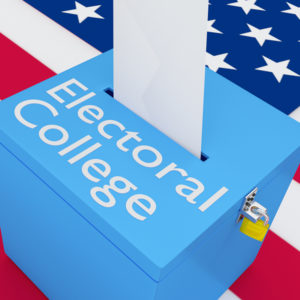Editor’s Note: For another viewpoint, see Point: Our Presidential Elections Are Broken; Here’s the Cure
“The great enemy of truth,” John F. Kennedy once said, “is very often not the lie — deliberate, contrived and dishonest — but the myth — persistent, persuasive, and unrealistic.”
Such myths threaten to tear down a constitutional institution that Kennedy once vigorously defended before Congress. Our 35th president was a supporter of the Electoral College, and he surely would have hated the constant drip of misinformation about the system.
These misperceptions threaten the very existence of America’s unique presidential election process. Yet none are true.
Perhaps the most pervasive of these myths is that “only swing states matter” because of the Electoral College. But are safe states really so unimportant in American presidential elections? Are some voters ignored?
Emphatically, no.
Interestingly, Electoral College opponents speak out of both sides of their mouth on this issue, but no one seems to notice.
If Texas “doesn’t matter” because it is a safe red state, then why are so many Republicans worried that the state will soon turn purple — and why are so many Democrats celebrating that very possibility? Texas and its 38 electors matter very much. The Republican Party does not want to run a campaign if Texas is in doubt. The GOP takes Texas for granted at its own peril.
Democrats feel the same way about California and New York.
Indeed, history is replete with stories of allegedly “safe” states changing sides and making a difference. States’ allegiances are like a pendulum, swinging slowly back and forth, depending on current events and the political parties’ responses to them.
Political parties that fail to pay attention will feel the ramifications at the polls.
California was once as staunchly Republican as it is Democratic today. Meanwhile, Texas was once reliably blue, voting for Democratic candidate Jimmy Carter as late as 1976. Similarly, several southern states voted for Democratic candidate Bill Clinton in the 1990s, but they haven’t voted for a Democratic candidate since.
And who can forget the election of 2000? Much is made of Florida and the outcome of its vote that year, but George W. Bush would have lost the election if he had not flipped the safe little blue state of West Virginia. Democrats had long been taking the state for granted, and West Virginia had finally had enough.
The state went from safe blue to safe red, all in one election cycle.
The examples don’t stop there. In 2016, the tiny safe red state of Utah threatened to go rogue. Voters didn’t like Donald Trump, but they didn’t like Hillary Clinton, either. It was thought that Utah might vote third party.
Electoral College opponents contend that safe red states like Utah “don’t matter,” but the Republican Party in 2016 knew better. It dispatched vice-presidential candidate Mike Pence to the state in the closing days of the campaign. Pence helped bring Utah back into the fold. Meanwhile, Hillary Clinton did the opposite. She took several blue wall states for granted, but she likely would have won the White House if she’d spent more time in places like Wisconsin and Pennsylvania.
The truth is that no presidential candidate can get to 270 electors without some combination of safe and swing states. The math simply doesn’t work otherwise. Every voter in every state matters. No state can safely be taken for granted.
Without the Electoral College, these dynamics completely change.
In a national popular vote system, victory goes to the candidate who can get the most individual votes. Naturally, the states and cities with the most individuals can expect to benefit. After all, candidates have limited time and resources, and they will need to gauge where to most efficiently spend them.
Such a decision is simply pragmatic. Candidates will be looking for the easiest way to rack up votes without overextending resources.
In this world, why would the Republican Party care if a few voters in Utah are feeling doubtful? The GOP gets more bang for its buck if it focuses on the big friendly state of Texas. Perhaps Republicans would promise oil interests everything they want, racking up votes by the millions. Meanwhile, Democrats would flock to California, catering to environmental interests there.
Electoral College opponents dismiss the possibility that these types of campaigns can win national elections, but history proves them wrong. Consider that in 1888, Grover Cleveland won the national popular vote with the overwhelming support of six southern states. He couldn’t gain traction elsewhere, and he lost the electoral vote.
Because of the Electoral College, Cleveland did not win the presidency that year. Such an outcome was appropriate. Americans deserved a United States President, not a Southern States President.
The Electoral College offers the best path forward for a country as big and diverse as America. The system forces presidential candidates to build a support base that is national in character.
An over focus on one region or one special interest group will fail. Instead, solutions must be proposed that appeal to as many states’ interests as possible, as a variety of states will be needed to win the White House.
Americans deserve nothing less.

